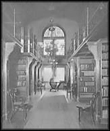
|
|
|
 |
|
 |
|
|
CyberArchive User's Guide
|
|
|
|
|
|
|
Welcome to the Photography Criticism CyberArchive. This constantly expanding resource already contains hundreds of essays and a number of complete books on various aspects of photography, and will grow steadily henceforth. We believe it makes an important contribution to online research about this medium.
We've tried to make this repository of writings about photography and related matters as intuitive to use and easy to navigate as possible. We'd like to think that our organizational structure is self-explanatory, so we urge you to browse through the CyberArchive and feel your way into it. However, a brief summary of some key points may help you.
- Now that you've logged in for the first time, you do not need to enter via the CyberArchive's main page. You can simply bookmark and return to the Archive Login page.
- Once you've logged in, you will find yourself on the Archive Search Page. You can access the CyberArchive's holdings through four different menus: Texts by Category (e.g., Photography Criticism, Catalogue Essays); Texts by Author (e.g., Donna-Lee Phillips, Lew Thomas); Texts by Subject (e.g., documentary photography, Diane Arbus); Texts by Title (e.g., "Directorial Mode, The," "Photography and Language"). You'll find links to separate pages for each of these menus in the CyberArchive navigation bar that always appears on the top of your screen.
- Additionally, you can use our Search the CyberArchive function to plug in your own keywords and investigate our holdings that way.
- Most of the material in the Archive appears here in html format designed for the Web. However, in some cases we offer --- instead of, or in addition to, the html versions -- pdf files readable with Adobe Acrobat Reader, and even occasional audio files. Whenever we present files in such formats as Acrobat or QuickTime, we include links to free downloads for the utilities required for such material.
- At the end of each essay, to enable your accurate citation thereof, you'll find the full bibliographic information for the original published source of that essay: essay author and title, name of periodical, volume, issue and date, and page numbers. (We rely on our authors to provide us with this data, which may occasionally contain gaps.) This should be sufficient for most scholarly citations. If you need the exact page number for a particular passage, you will have to locate the published version of the material. You can also cite its publication in this Archive; all texts that appear here should remain permanently online at this location, and citation of online texts has become an accepted scholarly practice. For information on how to cite online sources, click here.
- New material is added to the CyberArchive on a regular basis. From time to time, we may add new features as well. We list all such additions and innovations on the New at the CyberArchive page, and recommend that you check it whenever you visit.
- There's other relevant material online. As a courtesy to those who post it, and a service to our subscribers, we provide an extensive CyberArchive Links page. Embedded in our Text archives and on our Authors pages you'll find additional links.
- After logging in for a CyberArchive session, you can move freely throughout the CyberArchive. And you can go anywhere else on the Web -- following, for example, something on the CyberArchive Links page -- without logging off.
- You can logoff at any time by clicking the Logoff link on the CyberArchive navigation bar. You will be prompted to logoff if you go offline or start to shut down your computer. To maintain the security of your password and prevent its unauthorized use, which may result in suspension of access, we recommend that when accessing the Archive through any public terminal Ð at the library, at school, at the office, or elsewhere -- you follow these guidelines:
- Do not enable the terminalÕs security panel to remember the login.
- Quit your browser following logoff at the end of a session. This will delete your login and password from the browserÕs temporary memory.
- If you're a teacher, please check in to our Teachers' Corner, and note our special offer on CyberArchive Course Packs. We also have an Internship and Independent Study program.
- Books by some of our CyberArchive authors, and some other relevant texts, are available from the CyberArchive and from other sources.
- With the exception of a selection of public-domain material, all the texts in this CyberArchive are copyrighted by the CyberArchive and/or the individual authors. Our layout, design, and html work are also protected by copyright. We ask you to respect the intellectual property rights of our content providers.
- Toward that end, we suggest that you familiarize yourself with the information on copyright, "fair use," and plagiarism that we've posted here, as well as with the CyberArchive Rules. A brief perusal of this material will ensure a trouble-free subscription to our services.
- We're open to your suggestions for ways to make this Photography Criticism CyberArchive more useful to yourself and other subscribers. We'll also do our best to fill your requests for essays by present CyberArchive authors that we haven't already posted, and will follow up on your recommendations of additional authors to consider for inclusion in the CyberArchive -- including you, if you're a writer. Feel free to email us with your ideas.
We look forward to having you as a satisfied Photography Criticism CyberArchive subscriber/user.
-- Jasmine Gartner, Ph.D., Managing Editor
Photography Criticism CyberArchive
|
|
|
|
|
|
|
|
|
|
|
|
|
|
|
|
|
|
|
|
Back to top
All contents © copyright 2003-05
by A. D. Coleman/PCCA
and the authors and artists, except as indicated.
All rights reserved.
info@photocriticism.com
Site design by John Alley
|
|
|
|
|
|
|
|
|
|